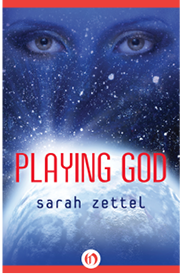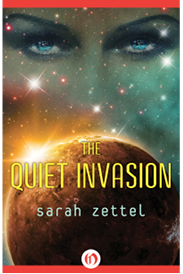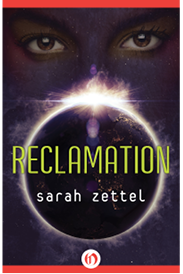Playing God (52 page)
Authors: Sarah Zettel

“Yeah, she did. She’s going to be all right. They’ve put her on the Council of True Blood, and you know what? I think the other Councilors are a little afraid of her.”
Arron raised his brows. “That could be a double-edged sword.”
“I know, but I think she’s going to handle it. She’s already spent most of her annual budget sending for half of Crater Town to come in and help. The Confederation squawked, but then she pointed out how much better they’d feel with more than one person around who knew how to work with the Humans’ communication web.”
Arron nodded in agreement that this was indeed a smart move. Maybe it was his silence that made Lynn really look at him.
“Are your…friends going to Crater Town, then?”
Arron nodded. “I don’t know what you and Theia said to the town council or the Bioverse seniors, but they’re all being allowed in. Apparently a new hole’s being developed, and if they’re willing to shoulder the work, they can have most of it.”
“Are you going with them?” asked Lynn softly.
Arron spread his hands. “What else am I going to do? They’re my sisters.”
Lynn opened her mouth and shut it again. “Of course.”
He wasn’t sure whether she meant it or not, but the fact that she wasn’t going to argue the point made him feel a bit better. “Is Bioverse going to make a noise over what happened?”
Lynn shook her head. “Surprisingly, no. They got the ship back, mostly intact. The troublemakers are going away. The Sisters-Chosen-to-Lead have convinced everyone they really didn’t know what was going on.” They exchanged a glance over that one, but neither of them said anything. “Besides which, the Confederation has quietly said they’d rather a noise not be made over it, and Bioverse is very sensitive to what the Confederation says these days.”
Arron felt himself smile. “I should think so.”
They looked at each other. He saw that Lynn still had dark rings under her eyes and felt the weariness that still weighed down his own muscles.
Lynn must have been thinking something similar. She gave him a wry grin. “We should be cheering, Arron. We both won.”
“Yeah, we did.” He rubbed his forearm. “I just hope the Dedelphi won with us.”
Lynn shrugged. “We’ll find out.” She paused. “When are you leaving?”
“Not until tomorrow. There’s a delay while Keale makes sure everybody is reregistered and ID’d under their proper names.”
Her tone grew tentative. “I was wondering if you’d like to come have dinner with me and David?”
Arron started. He chided himself for being so surprised, even while he said, “Are you sure?”
Lynn nodded. “I want us to be friends again, Arron.” She leaned forward. “Come meet my partner. Come sit on my couch and drink microbrew and have stupid arguments with me. Don’t leave me in silence for another ten years.”
He smiled, a real smile this time, reflecting the warmth he felt in his veins. “I won’t, Lynn. Not again.”
She stood up and so did he, and she took his arm, Dedelphi-style. “Come on then, Sister.”
“We are tired of fighting. We don’t want to kill anymore. But the others are treacherous and cannot be trusted.”
—Edward O. Wilson,
On Human Nature
W
HEN CREATING ANY CULTURE
in a work of science fiction, the author is repeatedly forced to ask the question, “How did it get this way?” When I created the Dedelphi, one of the many “its” I had to think about was their violence.
Violence is a complex issue. It exists on many levels, from the interpersonal to intergroup to international. Its origins are a mix of genetic predisposition, environmental and cultural reinforcement, and personal conscious choice.
In the case of the Dedelphi, the genetic predisposition to violence evolved first from balancing the need to protect oneself and one’s children with the need to protect one’s sister and her children. The Dedelphi are essentially a race of identical twins. Sisters from the same “bearing” share identical genetic material. If the theory that living beings are geared toward passing on their own genes to their offspring is correct, a Dedelphi sister’s children are as valuable in this regard as her own children, because her sister shares most, if not all, of her genetic heritage. Her sister, in reproductive terms, becomes her second (or third or fourth) self, an additional chance for her genes to be passed on. Protecting and sharing resources with that other self, and that other self’s children, increases the chance of genetic survival. This creates an increased sense of protectiveness toward the family, and a decreased self-preservation instinct.
These conditions led to a very tightly knit family structure, which was exacerbated by the fact that their world had few large continents. Most clans live on an island or archipelago where there is only the extended family. For long periods in their prehistory, Dedelphi clans did not interact with other groups. When another group was encountered, it was generally when the clan was in search of new space or resources. The native group would want to preserve all the available resources for their sisters, while the new group would want to take some (or all) of those resources for their sisters. This competition for available resources led to intergroup violence, which spun itself out down the generations, fueled by individual anger at harms done.
To further the problem, the males in the strangers’ clan could easily be seen as desirable resources. Dedelphi males invest all their remaining physical resources in reproducing. They do not retain any discrimination: If one clan’s males are removed, they will mate as easily with strangers as with their own clan.
As did early humans, early Dedelphi had a basic understanding of the need to outbreed. So, when a group of strangers arrived on a populated island, they would find not just food and space, but new genetic material for themselves and their sisters. Sisters and mothers raised the children. The father’s family was not as necessary for resource and parenting assistance as it is in primates, which have primarily single births. This makes the cost of offending the father’s family relatively small. The evolutionary balancing act became increasingly complicated, especially considering that only one sister of an entire family had to survive to pass on the majority of the family’s genes, as well as its individual traditions. Violence was costly in terms of personal and group resources, as well as individual lives, but not as costly as it might have been in another species. What was initially an evolutionary possibility became a cultural custom. Through 100,000 years of biological and cultural evolution, strangers became enemies, and the need to protect one’s sisters and their children became paramount.
All societies that evolve violent survival strategies (at least, all the ones we know about) also evolve rules about who may be hurt or killed, and under what conditions. If a culture is not completely suicidal, some concept of peace, friendship, or trust must exist side by side with the violence. With the concept of killing comes the concept of not killing. The existence of these ideas can give a freedom of choice to individuals in their daily interactions, even when those are with strangers. The ultimate question is, Which way will the balance tip: toward evolutionary predisposition, cultural conditioning, or individual choice?
—Sarah Zettel
Ann Arbor, 1998
THE AUTHOR WOULD LIKE
to thank Tim Smith, Laura Woody, and Dee Kenealy for all their expert input, the Untitled Writer’s Group for their support, suggestions, and honesty, and, of course and as ever, Dawn Marie Sampson Beresford, who keeps on listening.
Sarah Zettel is the critically acclaimed author of more than twenty novels, spanning the full range of genre fiction. Her debut novel,
Reclamation
, won the Locus Award for Best First Novel. Her second release,
Fool’s War
, was a 1997 New York Times Notable Book, and the American Library Association named
Playing God
one of the Best Books for Young Adults of 1999. Her novel
Bitter Angels
won the Philip K. Dick Award for best science fiction paperback in 2009. Her latest novel,
Dust Girl
, was named as one of the best young adult books of the year by both
Kirkus Reviews
and the American Library Association. Zettel lives in Michigan with her husband, her rapidly growing son, and her cat, Buffy the Vermin Slayer.

All rights reserved under International and Pan-American Copyright Conventions. By payment of the required fees, you have been granted the non-exclusive, non-transferable right to access and read the text of this ebook onscreen. No part of this text may be reproduced, transmitted, downloaded, decompiled, reverse engineered, or stored in or introduced into any information storage and retrieval system, in any form or by any means, whether electronic or mechanical, now known or hereinafter invented, without the express written permission of the publisher.
This is a work of fiction. Names, characters, places, and incidents either are the product of the author’s imagination or are used fictitiously. Any resemblance to actual persons, living or dead, businesses, companies, events, or locales is entirely coincidental.
Copyright © 1998 by Sarah Zettel
Cover design by Mimi Bark
978-1-4804-2217-9
This edition published in 2013 by Open Road Integrated Media
345 Hudson Street
New York, NY 10014





